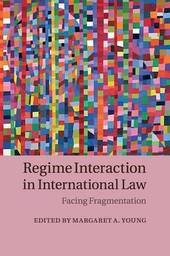
|
Regime Interaction in International Law: Facing Fragmentation
Paperback / softback
Main Details
| Title |
Regime Interaction in International Law: Facing Fragmentation
|
| Authors and Contributors |
Edited by Margaret A. Young
|
| Physical Properties |
| Format:Paperback / softback | | Pages:348 | | Dimensions(mm): Height 229,Width 152 |
|
| ISBN/Barcode |
9781107521780
|
| Classifications | Dewey:341 |
|---|
| Audience | | Professional & Vocational | |
|---|
| Illustrations |
1 Tables, black and white
|
|
Publishing Details |
| Publisher |
Cambridge University Press
|
| Imprint |
Cambridge University Press
|
| Publication Date |
16 April 2015 |
| Publication Country |
United Kingdom
|
Description
This major extension of existing scholarship on the fragmentation of international law utilises the concept of 'regimes' from international law and international relations literature to define functional areas such as human rights or trade law. Responding to existing approaches, which focus on the resolution of conflicting norms between regimes, it contains a variety of critical, sociological and doctrinal perspectives on regime interaction. Leading international law scholars and practitioners reflect on how, in situations of diversity and concurrent activity, such interaction shapes and controls knowledge and norms in often hegemonic ways. The contributors draw on topical examples of interacting regimes, including climate, trade and investment regimes, to argue for new methods of regime interaction. Together, the essays combine approaches from international, transnational and comparative constitutional law to provide important insights into an issue that continues to challenge international legal theory and practice.
Author Biography
Dr Margaret Young is an Associate Professor at Melbourne Law School, University of Melbourne, Australia. She was the inaugural Research Fellow in Public International Law at Pembroke College and the Lauterpacht Centre for International Law, University of Cambridge, from 2006 to 2008.
Reviews'Regime Interaction in International Law provides substantial food for thought on emerging practical and conceptual issues in the inter-relationship between multilateral actors. Well-thumbed copies ... should reside on the shelves of any serious scholar concerned with the present and future development of the international system and the ongoing evolution of the fragmentation debate.' Richard Caddell, Transnational Environmental Law 'The volume succeeds so well because it leaves the reader with no doubt of the importance and continuing relevance of its subject ... This framework may prove to be a useful analytical tool for thinking about the different ways in which regimes interact.' Neil Craik, Ocean Yearbook 36
|